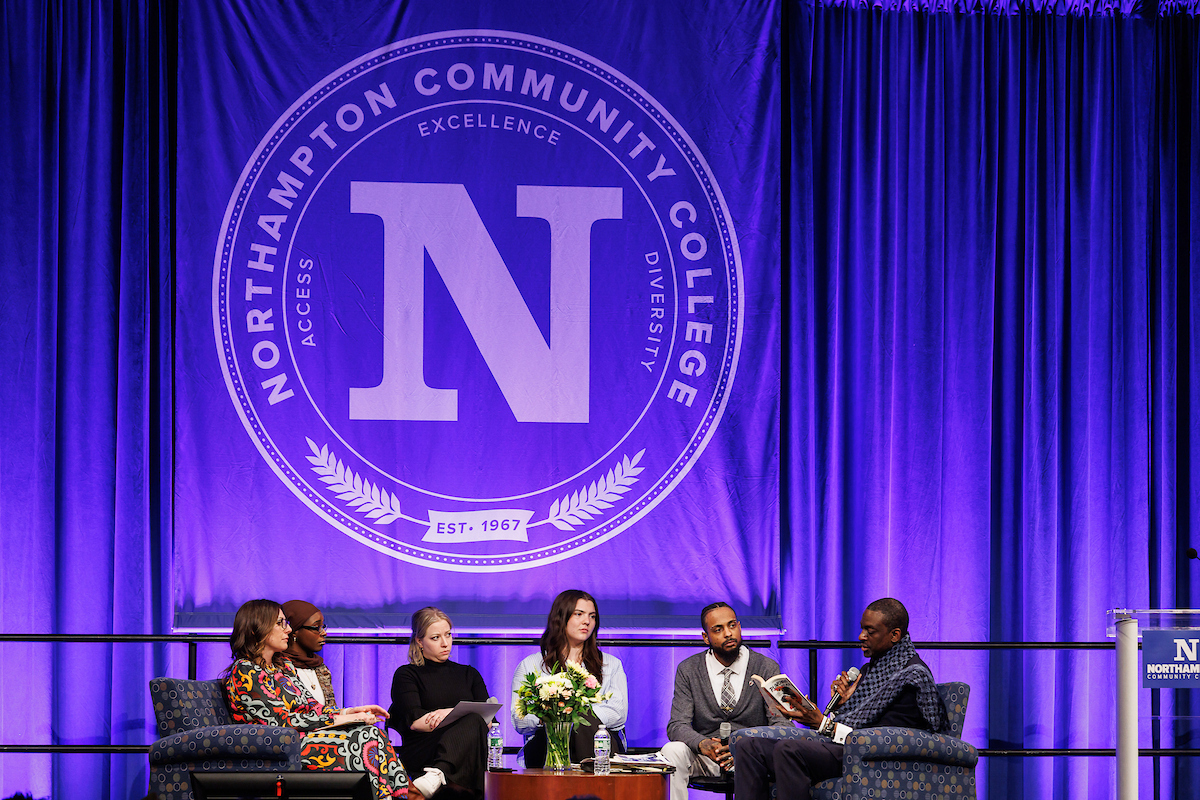Dr. Yusef Salaam, one of five Black and Hispanic teenagers falsely convicted of a crime they didn’t commit, told Northampton County College (NCC) students, faculty and community members last night to refuse to participate when another person tries to create a false narrative about you. Instead, hold onto to the nobility that is present in every human being, he said.
A New York City councilman, author, motivational speaker and recipient of President Barack Obama’s Lifetime Achievement Award, Dr. Salaam was the keynote speaker for NCC’s Annual Humanities Program. He answered questions from NCC students and Psychology Professor, Megan Nocek, in front of a large, age-, race– and ethnic–diverse crowd assembled in the Arthur L. Scott Spartan Center on Bethlehem campus.
Dr. Salaam and four other black and Hispanic teenagers, initially known as the “Central Park Five,” were arrested in 1989 and later convicted of beating and raping jogger, Trisha Meili. All five accused men confessed that they had been involved but had not raped her. They later claimed the confessions resulted from police beatings and threats. In 2002, they became the “Exonerated Five” when serial rapist Matias Reyes confessed to being Meili’s sole assailant. DNA evidence confirmed his involvement.
Dr. Salaam shared his experience in his book, “Better, Not Bitter: Living on Purpose in the Pursuit of Racial Justice.” The city of New York has since paid the “Exonerated Five” $41 million in accordance with a settlement of a lawsuit filed by the men.

Students chat with Salaam during the Keynote
Dr. Salaam recalled April 19, 1989, saying he was in the park on that night when several young men attacked, assaulted and robbed walkers, bike riders and joggers. He was arrested the following day and taken to the police station for interrogation. While waiting to be questioned, he could hear police beating up fellow accused Korey Wise in the next room.
The councilman described his fiercely protective mother’s arrival in the police station. She demanded to know where her son was and told the police that he was only 15, and they didn’t have the right to question him.
“I fell into my other’s arms,” Dr. Salaam said. “I wanted the nightmare I had awakened to to end.” His mother told him to stand up, look them in the eye, and refuse to participate in what they were attempting to do.
The case attracted national attention. The police had constructed a false narrative that was repeated by the media and amplified by rich and powerful people, Salaam said. He held up a newspaper ad then, real estate magnate and now President, Donald Trump, placed in all four New York City newspapers on May 10, 1989. Large letters read, “Bring Back the Death Penalty, Bring Back the Police.” The ad’s content encouraged the quick prosecution and punishment of the deviants who had done this terrible evil. Trump said he wanted the “criminals of every age to be afraid.”
He was convicted. Dr. Salaam, who had aspired to be a hip-hop artist, recited a poem he had written at his sentencing hearing. The media mocked it. He was sentenced and would spend seven years in prison.
About six months after being incarcerated, a prison officer asked him, “Who are you?” He replied that he was one of the Central Park Five but didn’t do it. The guard responded, “I know you didn’t do it. You’re not supposed to be here.” He again asked, “Who are you?” Because of that encounter, he studied his name and discovered it meant, “God will increase the teacher with justice and peace.”
Dr. Salaam, a Muslim, relied on his faith during prison and believed he was born with a purpose. Yusef is the Muslim equivalent of the English name Joseph. Dr. Salaam compared his story to that of the biblical character of Joseph, who was cast into a well by his seven brothers, later accused of rape and imprisoned for seven years, only to be returned to his family and become a leader of his people. Seeing the parallel in his own life, he set out to seek justice and be a leader, not unlike Joseph.
He advocates for criminal justice reform, prison reform and the abolition of juvenile solitary confinement and capital punishment. Twenty-one years after his exoneration, he was sworn in as New York City councilman and continues to do the work to make circumstances better for his community.
“Everyone wants to live a diamond life,” he said. To become a diamond, however, a piece of coal must undergo extreme pressure for a very long time. He added that diamonds don’t shine but rather reflect. The real battle is not giving in to spiritual weakness in dark and low places, but to project light.
“Be a diamond that reflects light in a world that badly needs light,” he said.
We are currently participants in someone else’s plan. For it to be successful, however, we need to participate. But don’t. Instead, fight back against injustices, including the large proportion of black and brown men in prison, he said. Talk about injustices, protest, and contact elected representatives.
“The people who want a better, more equal, and just way are not outnumbered. We are outorganized.” Don’t leave this world without leaving your trace, bring forth your gifts. Direct your anger into peaceful activism, he said.